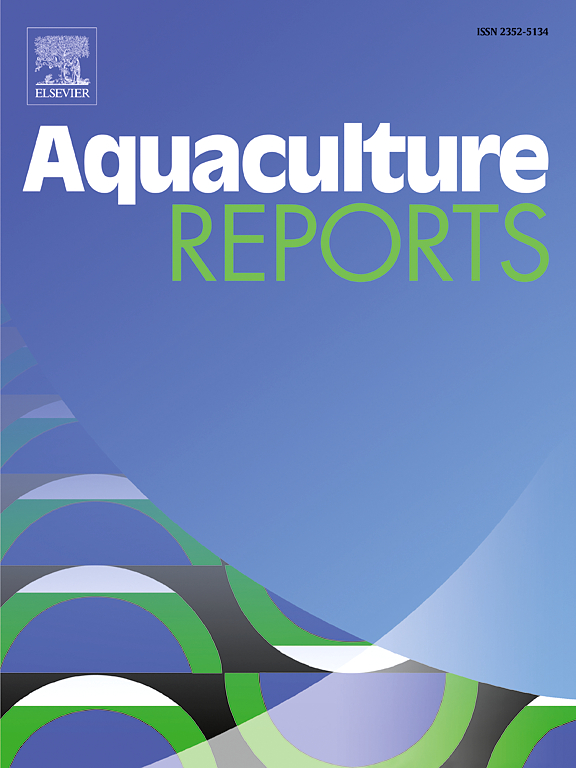水生烷基酚外源诱导鲤鱼先天免疫、应激反应和免疫/凋亡相关基因的改变:丹参的缓解作用
IF 3.7
2区 农林科学
Q1 FISHERIES
引用次数: 0
摘要
目前的观点旨在调查长期暴露于烷基酚(壬基酚;NP)对体液免疫反应、血液蛋白和应激指标以及免疫和促/抗凋亡基因表达的影响。此外,本研究还评估了鼠尾草叶粉(CSLP)对NP毒性的潜在改善作用。选取240尾镜鲤,随机分为4个试验组(每组3个重复,每个重复20尾),分别为对照组、cslp添加组(4 g/kg)、NP暴露组(0.1 mg/L)和NP暴露组,试验期60 d。暴露于0.1 mg/L水平的NP显著(P <; 0.05)降低了血清免疫生化生物标志物(溶菌酶活性、补体-3、总蛋白、白蛋白和球蛋白水平),显著增加了应激指标(葡萄糖和胆固醇)水平。在分子水平上,0.1 mg/L的NP暴露诱导免疫相关基因表达下调(白介素1 β、toll样受体7、白介素10、磷酸肌醇-3激酶调节亚基3b(γ)和核因子kappa β p65)。暴露于NP后,促凋亡基因(Bcl-2相关x蛋白和半胱氨酸-天冬氨酸蛋白酶3b)升高,抗凋亡基因(b细胞淋巴瘤2)下调。此外,抗氧化(超氧化物歧化酶)和DNA修复(增殖细胞核抗原)基因的表达被破坏。相反,饲粮中添加CSLP可缓解np暴露组上述免疫生化和应激反应参数的变化。它还恢复了免疫、抗氧化和凋亡调控相关基因的紊乱。综上所述,NP可能是一种免疫毒素和细胞凋亡诱导剂。由于其对NP毒性的缓解作用,CSLP在水产饲料中是一种成功的膳食补充剂。本文章由计算机程序翻译,如有差异,请以英文原文为准。
Waterborne alkylphenol xenobiotic induces alteration of innate immunity, stress response, and immune/apoptotic related genes of Cyprinus carpio: Alleviation effect of Salvia officinalis
The current perspective aimed to investigate the consequences of chronic exposure to alkylphenol xenobiotic (nonylphenol; NP) on humoral immune response, blood proteins, and stress indices as well as the immunological and pro/anti-apoptotic gene expression. In addition, this study assessed the potential ameliorative effect of common sage leaf powder (CSLP) against NP toxicity. A total of 240 mirror carp (Cyprinus carpio var specularis) were randomly distributed into four experimental groups with three replicates per group (20 fish/replicate) for 60 days: a control group, a group fed CSLP-supplemented diet (4 g/kg), a group exposed to NP (0.1 mg/L), and NP exposed group co-fed CSLP-supplemented diet. The exposure to NP at level 0.1 mg/L significantly (P < 0.05) decreased serum immune-biochemical biomarkers (lysozyme activity, complement-3, total protein, albumin, and globulin levels), with a marked increase in stress indicators (glucose and cholesterol) levels. On the molecular level, exposure to NP at level 0.1 mg/L induced a down-regulation of immune-related gene expression (interleukin 1beta, toll-like receptor 7, interleukin 10, phosphoinositide-3-kinase regulatory subunit 3b(gamma), and nuclear factor kappa beta p65). The pro-apoptosis genes (Bcl-2 associated X-protein and cysteine-aspartic protease 3b) were boosted and the anti-apoptosis gene (B-cell lymphoma 2) was down-regulated by the exposure to NP. In addition, the expression of antioxidant (superoxide dismutase) and DNA repair (proliferating cell nuclear antigen) genes were disrupted. Conversely, dietary CSLP alleviated the alterations in the above-mentioned immune-biochemical and stress response parameters in the NP-exposed group. It also restored the disturbance of immune, antioxidant, and apoptosis regulatory-associated genes. In conclusion, NP could consider an immunotoxin and apoptotic inducer in C. carpio var specularis. The CSLP is a successful dietary supplement in aquafeed for its palliative effects against NP toxicity.
求助全文
通过发布文献求助,成功后即可免费获取论文全文。
去求助
来源期刊

Aquaculture Reports
Agricultural and Biological Sciences-Animal Science and Zoology
CiteScore
5.90
自引率
8.10%
发文量
469
审稿时长
77 days
期刊介绍:
Aquaculture Reports will publish original research papers and reviews documenting outstanding science with a regional context and focus, answering the need for high quality information on novel species, systems and regions in emerging areas of aquaculture research and development, such as integrated multi-trophic aquaculture, urban aquaculture, ornamental, unfed aquaculture, offshore aquaculture and others. Papers having industry research as priority and encompassing product development research or current industry practice are encouraged.
 求助内容:
求助内容: 应助结果提醒方式:
应助结果提醒方式:


